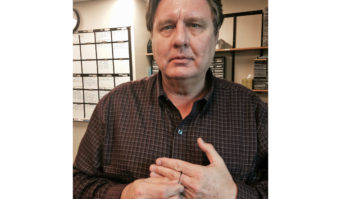

A career in audio can be fabulously satisfying, but it can also be ridiculously demanding. Many of you never question working nights and weekends. It comes with the territory, and in a sense you wouldn’t have it any other way. Creative people love their work, love the intense process, love the finished product. Up to a point, doing great work in your chosen career is worth every sacrifice.
Illustration: Tad Majewski
This article is meant to explore the ways engineers, producers and studio owners (or some combination thereof) attempt to find balance between the personal and the professional. Some of you may be in for a reality check. Others may be inspired by the ways some of the hard-working professionals we interviewed make things work. But it’s important to note that there’s no finger- wagging here, no judgment — just some real-life stories about the profession Avatar Studios’ Brian Montgomery described as “only comparable to the demands of a medical career.”
WHAT’S YOUR STATUS?
Bob Irwin (Sundazed label co-owner; reissue producer for Sundazed, Sony BMG, Arista, and others): I met my wife, Mary, through music 25 years ago. I was playing in a band with her brother. We hit it off, and we were married four months later. Mary and I started Sundazed together 18 years ago, when our daughter was a toddler. It’s funny that you ask about this now. Our daughter, Katie, is starting her new job at Sundazed this week.
Read how other theater and performing arts professionals balance their careers and personal lives at livedesignonline.com.
Brian Riordan (post mixer/studio owner, Levels Audio Post, Hollywood): My wife, Marrin, and I have been married for six years; we dated for 11 years prior to getting married. We have a daughter who is 15 months old. Before having a kid, my wife and I worked together. She handled all the administration here at Levels, so that was one of the ways we made it work: If we weren’t working together then, she never would have seen me. My wife stopped working at the facility seven months into her pregnancy.
Zoe Thrall (facility manager, Studio at the Palms, Las Vegas): My husband, Pat, is in the industry, as well. He was a touring musician for 20 years. We have no children.
Brian Montgomery (staff engineer, Avatar Studios, New York City): I’m in awe of people who manage to keep a healthy relationship, but it’s very difficult to fit in at this point in my career.
Joey Turner (freelance engineer): I married my high school sweetheart. We’ve been together since we were 16, and we know each other really well, which helps us get through a lot of stuff. She understands the dream, you know? We’ve been married for eight years and we’ve got a 5-month-old son, Riley.
Trina Shoemaker (Grammy-winning freelance engineer/mixer): I met my husband in a club. He was singing and playing guitar. Love at first sight, believe it or not. I left a note for him on the stage with my phone number and the message, “If you’re single and live in Louisiana, you should call me.” He did and I told him, “I’m not here to make a demo for you or get you a record deal. I want a date with a man who likes me and thinks I’m beautiful.” We went on a date and 10 months later, I was pregnant with my son [who is now 2].
EARLY DAYS
Irwin: We laugh about it now, but we started Sundazed in the dining room of our house with a broken typewriter and a princess phone. We had a separate phone line, and my daughter remembers this: When the phone rang, we’d say, “Katie, shhhhh, it’s a business call.”
Thrall: At the beginning, my whole life was focused on my career. All the people I know in this industry who worked to any successful level at that point in their career were the same way. There were many sacrifices and holidays missed. I’m very close to my family, but they understood the path I chose.
Montgomery: I started at the bottom, as an unpaid intern, working 40 hours a week. I quickly worked my way up, adding more and more hours to my work week. I was able to live at home with my parents, which helped, though I was commuting more than an hour each way between Manhattan and Long Island.
Turner: Before I went freelance, I was chief engineer at Omnisound [Nashville] and that was worse in terms of time with family. Being the head engineer at a studio, you have to make sure everyone’s session is going smoothly. That was 24/7, with no end in sight.
Shoemaker: The career before child was all that there was, and that’s what it required in my life. To make my career what it is now, it was 12, 15, 20-hour days every day for the better part of 15 years. There wasn’t a husband; there wasn’t a boyfriend for that matter. There certainly weren’t any children. There was a dog.
EVERYTHING CHANGES
Riordan: I’m getting better at turning things away, and saying, “I’m not going to work all weekend.” I’ll work Saturday but not Sunday. And these are all difficult things for an entrepreneur and an owner/operator, but now everything’s got to pass the life’s-too-short test. I’m trying to look ahead as a father and husband and create a comfort zone financially, but all the money in the world doesn’t do you any good if you’re never home.
Thrall: To take this job, I moved from New York to Vegas, and I left behind my friends and family. Even as busy as I was in New York, I always knew that they were an hour away. Moving to Las Vegas was a positive move, but a very tough one for this reason.
Montgomery: Now things are easier financially. I have a unique position in that I’m on-call at least 40 hours per week. I phone the studio every night to find out what my schedule will be for the following day. For example, I would call on a Friday night to find out about Saturday, Sunday or Monday. I can’t make too many plans, though, because on any given day, unless I’m in the middle of an ongoing project, I rarely know what I’m going to be doing next.
Top L.A. mixer Reyanne with his dad, Brian Riordan
Shoemaker: When I was about 37, I thought, “I’ve got a stack of CDs. I’ve got some Grammys. I’ve got some money. I’ve got nothing else. I’m alone. I have no family. And what I have now doesn’t really have any meaning to me anymore. It’s fun. It’s a huge achievement, but I’ve already achieved it.” These thoughts had been brewing and my biological clock was ticking, and I actually was on NPR doing an interview about the music business, and suddenly I thought, “Well, I quit as of today. This is the last record I’m going to make, and I’m canceling all other scheduled work.” I said, “Until I find a life outside of the studio, until I find a partner and have a kid, I’m walking away.”
WHAT GIVES
Irwin: Even after we were more established with some success for the label, this happened like clockwork for at least three years running when we went to take a vacation: There would be a big trip planned, and I’d get a phone call from a client saying I had to be in New York to produce an album. I’d say, “I’m leaving for Disneyworld with my family on Tuesday,” and they’d say, “We need you to do this.” And I’d stay behind, not because I needed to put food on the table, but because I loved the work and I didn’t want to lose that client. But after three years of this, I realized this kind of crap is never going to stop, and it wasn’t going to change anything for me to take a vacation.
Thrall: The last vacation we took was in 2000. The shame is, two summers ago, I was supposed to go for two weeks to Greece with my family. My roots are there, and Pat had never been there. But believe it or not, because I had started this job, I couldn’t go.
Riordan: Things that fall into the category of more recreational-type business where, let’s say, a client wants to play a round of golf — well, that’s a whole Sunday I won’t be with my family who I haven’t seen for three weekends. It’s those kind of things that just have to give. It’s not easy to look at clients who have the potential for a bunch of work and say “no” to those things, but eventually you have to look down at it from 1,000 feet. The clients are going to keep coming because I did a good job, not because I did or didn’t play 18 holes of golf with them.
Turner: At first we thought my wife was going to be a stay-at-home mom with our son, but she has a full-time job at BMI, and we realized we couldn’t give up the steady paycheck or the health insurance from her job.
Shoemaker: I leave my mixes at 7 p.m. so I can be at home with my son and be his mom. This doesn’t work for some clients, and as a result I lose some gigs, but I’m okay with that. I let everyone know in advance of the hours I now keep.
HAVING IT ALL
Irwin: I think the boat rises with the tide. If you’re a creative person and you’re creatively satisfied, that makes for a better life all around.
Riordan: You sleep “x” amount of hours, you work another amount and you’ve only got a few hours left. How are you going to use them?
Thrall: Being around creative people is very satisfying: that free spirit that doesn’t let outside things govern it. It’s inspiring.
Montgomery: If you love what you’re doing, it doesn’t feel like work at all.
Turner: I do the nighttime feeding. If I can’t be with my son throughout the day, at least if he’s crying in the night, he knows I’m going to be there And if clients call and they want me to drop everything on a Sunday or late at night for their project, I tell them, “Look, there are no musical emergencies.”
Shoemaker: There’s no such thing as having balance when you’re starting out in your career. Nobody gets that. But by the time you’re in your mid-30s, you better look at it real close.
Barbara Schultz is a Mix assistant editor.

READ
Find out other ways these interviewees find a balance between home and work here.






